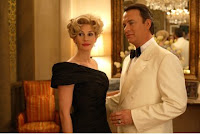Charlie Wilson’s War is basically a toned down version of a West Wing episode, and that’s probably why it’s such a good movie. Comparisons arise from the fact that the movie was written by West Wing scribe Aaron Sorkin, and the movie benefits from his fast-paced and comical dialogue, which makes complicated issues accessible to a large audience.
Tom Hanks plays the title character, a Democratic Congressman from
Charlie Wilson is not an idle member of the House of Representatives, which is why after seeing a piece about the Mujahideen rebels fighting the Soviets in  action.
action.
With a renewed vigor Charlie decides to use his position on the Defense Appropriations Subcommittee to aid the Mujahideen rebels, but he’s unsure of  how best to broach the situation. With the help of CIA operative Gust Avrakotos, played by Philip Seymour Hoffman, Charlie brokers a deal to arm the Mujahideen rebels. Hoffman is hilarious as the righteous CIA operative, and if he is not nominated for his work in The Savages or Before the Devil Knows You’re Dead, then he will surely receive recognition for his work in this film. The rapport between Hanks and Hoffman warrants making Charlie Wilson's Summer Trip with Gust.
how best to broach the situation. With the help of CIA operative Gust Avrakotos, played by Philip Seymour Hoffman, Charlie brokers a deal to arm the Mujahideen rebels. Hoffman is hilarious as the righteous CIA operative, and if he is not nominated for his work in The Savages or Before the Devil Knows You’re Dead, then he will surely receive recognition for his work in this film. The rapport between Hanks and Hoffman warrants making Charlie Wilson's Summer Trip with Gust.
The movie concludes with the withdrawal of Soviet troops from
This last note is what makes the movie politically relevant today, because the movie stands as a cautionary tale for what can happen when we up and leave a country that isn’t ready to stand on its own. The final quote of the movie, which implies that we brought the attacks of September 11th on ourselves by not ensuring the end game, is a notion that holds some merit but is hardly black and white as the film frames it.
The dialogue has bite, the action moves steadily along, and the story is entertaining from start to finish. This might not be a movie that I’ll have to own on DVD, but it’s definitely worth a trip to the theatres.
No comments:
Post a Comment